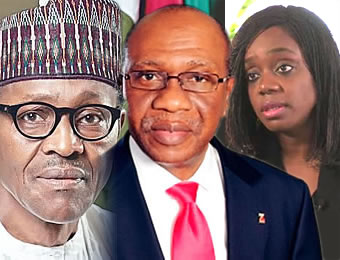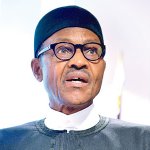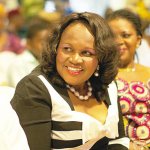SULAIMON OLANREWAJU, who was at the World Bank/International Monetary Fund meetings in Washington, writes on what Nigeria stands to benefit as a result of its participation at the annual event.
The recently concluded International Monetary Fund/World Bank annual meeting in Washington, capital city of the United States of America, provided Nigeria a great opportunity to improve the performance of her portfolios with development partners, in addition to pursuing further areas for greater co-operation while maximising available funding sources to help in the achievement of its economic priorities.
While addressing journalists at the end of the week-long event that saw the convocation of world’s leading financial and monetary experts at the global finance headquarters in Pennsylvania, Washington, leader of the Nigerian delegation and Finance Minister, Kemi Adeosun, said, “One of our key objectives coming out here was to see how Nigeria could better take advantage of our relationships with the multilateral agencies and with our friends and supporters in the ministries of finance and treasury departments of the various countries.”
She added that the outing was a good one for the country going by the agreements that were reached with a number of multilateral agencies and countries. According to the minister, the Nigerian delegation was able to interface with leaders of the IMF and the World Bank Group, while it also held meetings with other institutions such as the US Treasury and UK Department for International Development (DFID), Japan International Co-operation Agency (JICA) and the Islamic Development Bank (IDB).
Speaking about the fruits of the engagements, the minister said that hopes were high about positive improvements being witnessed in diverse sectors as a consequence of the agreements.
$1.3bn for takeoff of Development Bank of Nigeria
Mrs Adeosun said, “Agreement was reached on the final steps for the take off of the Development Bank of Nigeria which had been stopped due to some issues. We have resolved all those issues, the recruitment process has now been finalized with management team put in place.”
Explaining the rationale behind the establishment of the development bank, the Minister said the $1.3billion project would specifically support Small and Medium Enterprises (SMEs).
“SMEs are part of the engine that will spur the growth of our economy. SME lending at low rates will now be facilitated through the DBN and we are ready to resolve the outstanding issues,” she said.
She explained that the establishment of the DBN would enhance the capacity of SMEs to create employment opportunities. She said “If we have SMEs with great capacity to create employment, we would have tackled one of the major challenges our country is currently contending with. So, this is very important to us.”
Power Sector
The minister said, “We also had high level discussion on the challenges in the power sector, these challenges were seen to be financial challenges therefore an agreement was reached that there will be a workshop in Abuja in November that will be attended by the World Bank Group, IFC and MIGA, which provided partial risk guarantees, the Ministry of Power, the Ministry of Finance, the CBN, NNPC for the gas perspective, the GENCOs, DISCOs and other stakeholders in the power sector. The World Bank is bringing its specialist power finance team to see how they can proffer financial solutions to the challenges of power in Nigeria.”
The minister underscoring the importance of this said one of the major hindrances to the nation’s development is the poor electricity supply. She noted that the GENCOs and the DISCOs had been complaining about financing their projects, adding that with this intervention there was hope that the knotty issue would be permanently resolved.
Adeosun added that the team also held discussions with the Japanese International Cooperation Agency (JICA) and was able to secure its support for investments in the Jebba hydro project, which is a power project, as well as investment in other sectors.
Domestic revenue mobilisation
Speaking on efforts to mobilize revenue locally, the minister said, “We plan and have agreed on technical support in the area of domestic revenue mobilization and we’re going to make more use of the IMF’s online training in financial management, we will be incentivizing our staff who are interested in taking these courses to do so.
“We had a meeting with the IFC, which is the private sector investing window of the World Bank Group, even though they have significant investment in Nigeria, it is limited to a number of sectors. They significantly want to scale up and we’ve agreed with them on two things. One is that we’ll host a road show to showcase Nigerian indigenous companies that could be eligible for IFC inward investment and we’ve agreed with them also that we should try to develop a pipeline of products. Rather than waiting for IFC to look for companies, the Ministry of Finance should take a proactive role in showcasing some of our eligible companies for IFC which we believe will crowd in more private sector investment and the jobs and growth that we need.”
Still on the IFC’s support, the minister said, “Our constituency, which represents South Africa, Nigeria and Angola, had a meeting here and we reviewed the fact that the allocation to our constituency is among the poorest particularly and this is unacceptable. Our constituency countries agreed to strengthen co-operation with a view to, in particular, exploring how best to position our countries to benefit from current funding options in the Multilateral Finance Institutions (MFIs), as well as the additional anticipated innovative financing mechanisms in the near term. The scope of co-operation will include technical benchmarking and peer review. A joint stakeholder meeting, to be hosted in Abuja is being planned for March 2017.”
Digital economy
The minister said, “On digital economy, I think one of the things that resonate about this is that is where growth is going to come from. I think that is where Nigeria has an advantage, because we have a young population, and they are very agile. What we have been advised to do, and what we will try and do is to scale up our capacity in those areas, so that young Nigerians can take advantage of what the digital economy has to offer.
“We can say that that is where things are going. We are very talented in that area; if we get our infrastructure going, we can compete, and the beauty of the digital economy is that you can be anywhere. You can create an app anywhere in the world and you can, with technology, be selling anywhere in the world.
“I think it is a key area for us, and it is got to be supported by infrastructure and that is why when we are talking about power; when we are talking about all these transactions that we are doing, that’s all to support the growth of the digital economy, which is definitely the way to go.”
Adeosun added that Nigeria’s young population is actually a strength, and the youth are definitely part of the solution. “So, we will definitely be focusing on how we scale up in that area.”
Poor funding of projects
She disclosed that following discussions with the World Bank Group Country Team on Nigeria, the delegation reached an agreement on a framework to improve the unacceptably low rate of performance and disbursements of Nigeria portfolios, which currently stands at 13 percent.
According to her, the measures to be taken include, the review of project origination, design and implementation issues; detailed review of particularly low performing projects; possible restructuring or reallocation of irredeemable project components; strengthening of implementation capacity, including capacity for effective monitoring and evaluation; regular monthly portfolio review meetings with the World Bank Group; as well as regular briefing of the Federal Executive Council (FEC) and National Economic Council (NEC) on the performance of Nigeria portfolios.
She, however, explained that this exercise would not be limited to the World Bank but all multilateral and bilateral projects and programs.
She added that the team was able to secure the commitment of Canada to assist Nigeria in the provision of Technical Assistance and other advisory services to enhance the delivery of projects using the Private Public Partnership (PPP) model.
Illicit funds
On illicit financial flows, the minister said, “We had some high level discussions with a number of countries where we have Nigerian money domiciled. When we talk about illicit financial flows there is a number of issues involved- those from corrupt practices, tax evasion, tax avoidance and those who under pay tax. But we are working hard to bring them back to the country.”
She said she could not volunteer much information about the progress made during the meetings as she had to brief President Muhammadu Buhari before making the agreements reached on the matter public.
Rating agencies
Speaking about rating agencies viewed the country, the minister said, “We met with the rating agencies as you know they recently had some rating actions on Nigeria, we met with Moody, Fitch and Standards and Poor’s; and had an interactive session with them where we updated them on our economic plans and giving them the picture of what we are doing. Overall, it was a very positive engagement we have some takeaways and we remain very confident that that the strategy we are pursuing will result in some quick recovery of the Nigerian economy.”
Others
According to Adeosun, specific commitments were secured on a number of programmes which include the $500m irrigation project covering the Bakalori, Kano River and Hadejia Valley irrigation schemes, which had been delayed by the due counterpart funding of $4m. She disclosed that the Ministry of Water Resources had confirmed that the Federal Government had made the counterpart payment as part of the recent releases of funds. This, she said, would enable the immediate take off of the project.
She said the delegation was able to present the Family Homes Fund, an affordable housing initiative, to a number of prospective development partners including the World Bank Group, IFC, MIGA and IDB, and received indicative interest, which the ministry would be pursuing. She also spoke about the agreement that was reached to expedite action for the take-off of the $500m North East social safety net project.
In spite of the minister’s enthusiasm about the prospects of effecting a positive change in the economy as an aftermath of the country’s participation at the meetings, there are still some doubts in some quarters about the fruitfulness of Nigeria’s partaking in the annual event because of the failure to explore the opportunities offered by similar meetings in the past. To this, the minister said there would be an outline of action plans that would be taken to guard against the opportunities being frittered away. She promised that in a very short while Nigerians would begin to see the benefits of “our participation at these meetings.”
Going into specific, she said, “As a follow up to our meetings with some of these agencies, already the workshop on power sector financing is already slated for November and another meeting on the MFIs is to hold in March next year. We intend to avail ourselves of the full benefits of these meetings and we hope to improve our economy as a result.”







